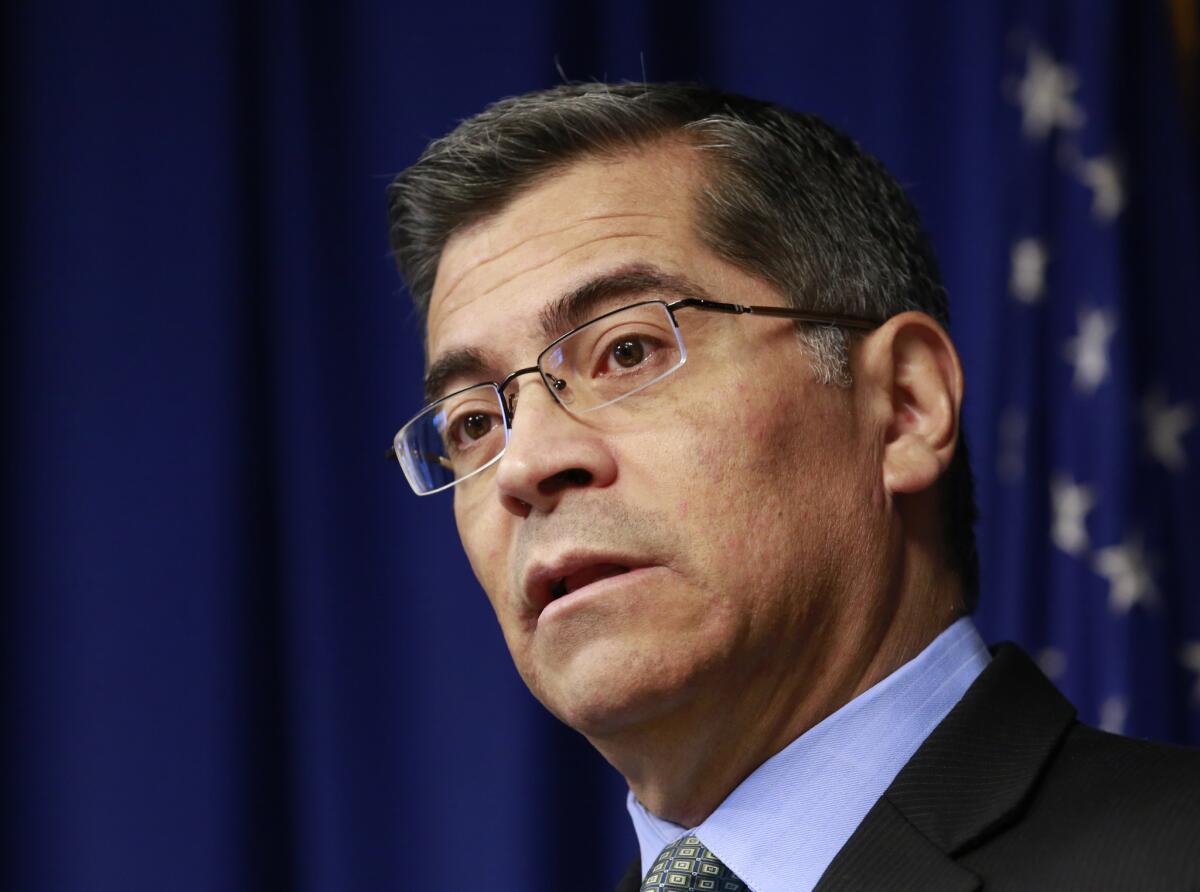Becerra reaches settlement with Kern County sheriff, resolving four-year civil rights probe

The Kern County Sheriff’s Office and the California Department of Justice have resolved a four-year investigation of potential civil rights abuses with a settlement that implements modest reforms and places the sheriff’s office under oversight from an outside monitor, Atty. Gen. Xavier Becerra said Tuesday.
Becerra had overseen an investigation opened in 2016 by his predecessor, Vice President-elect Kamala Harris, that probed civilian complaints of excessive force and other misconduct by the Kern County Sheriff’s Office and the Bakersfield Police Department. The investigation was civil — not criminal — in nature.
In a seven-page complaint filed Tuesday in Kern County Superior Court, Becerra’s deputies alleged that the sheriff’s office used excessive force on residents of Kern County, particularly with the use of its canines; carried out unreasonable stops, searches, arrests and seizures; and committed “legal violations” in using deadly force against people with mental disabilities.
“After a comprehensive investigation,” the complaint says, “the Attorney General’s Office concluded that because of defective or inadequate policies, practices, and procedures, [the Kern County Sheriff’s Office] has failed to uniformly and adequately enforce the law.”
Yet during a press conference with Sheriff Donny Youngblood and Kern County Supervisor Leticia Perez, Becerra, who has been tapped by President-elect Joe Biden to lead the U.S. Department of Health and Human Services, struck a far more conciliatory tone.
He stressed the investigation’s “good outcome”: A 59-page settlement in which the sheriff’s office agreed to review its use-of-force policies, change how it trains and deploys canines, lay out a plan to recruit deputies from diverse backgrounds, and improve how it accepts and investigates civilian complaints, among other reforms.
Few California Democrats have garnered more praise from the party’s various constituencies than Atty.
Youngblood pushed back on the state’s written allegations, emphasizing that the settlement makes no legal finding that his office had committed civil rights abuses.
“We do not believe — I do not believe — that the men and women of this department have ever violated constitutional rights,” he said. In the end, he added, “We could go to court and let a judge and jury decide whether we’d done anything right, wrong or indifferent — or we could go to the table with the Department of Justice.”
Youngblood said his office has already implemented 70% of the settlement’s proposed reforms. The Kern County Board of Supervisors has allotted funding to equip every sheriff’s deputy with a body-worn camera, he said, as well as to hire 42 more sworn and professional personnel, some of whom will be tasked with monitoring body-worn camera video and releasing it through public records requests.
“We’re not starting from square one,” Youngblood said.
Asked whether the state’s investigation uncovered evidence of civil rights violations, Becerra said that rather than taking the department’s allegations to a “fact-finder” in the courts, he was “trying to move the ball forward” with the agreed-on reforms.
Becerra defended the length of the probe, which spanned four years. He said its second prong, which is examining the Bakersfield Police Department, remains ongoing; he declined to discuss it.
“These things take time,” he said. “You need to make sure you’re doing this right.”
Harris had opened the investigation weeks after a Bakersfield police officer killed a 73-year-old man, Francisco Serna.
At the time, the Bakersfield Police Department said the officer opened fire only after telling Serna to take his hand out of his pocket and stop walking toward the officer. Serna in fact did not have a weapon in his pocket, but a dark-colored crucifix.
California attorneys general have previously launched civil rights investigations into police departments in Maywood and Riverside.
In Maywood, a two-year probe overseen by then-Atty. Gen. Jerry Brown found that the small city in southeastern Los Angeles was patrolled by “rogue cops” who arrested people without probable cause, failed to investigate citizen complaints and routinely used excessive force, all without oversight from Maywood’s elected leaders.
Maywood reached an agreement with the state that required the city to raise its hiring standards, publish annual audits of the police department’s operations, and equip police officers with audio recorders and their cruisers with video cameras, among other reforms. A year after entering the agreement, Maywood chose to disband its police force and contract with the Los Angeles County Sheriff’s Department.
More to Read
Sign up for Essential California
The most important California stories and recommendations in your inbox every morning.
You may occasionally receive promotional content from the Los Angeles Times.











